- Home
- Lynne Reid Banks
The Warning Bell Page 26
The Warning Bell Read online
Page 26
Besides, by the time the formal ordeal of the Sunday lunch came upon her, she had already had a talk with her mother about Tolly.
She had not had the faintest notion what Mrs Robertson’s attitude was likely to be to the radical proposition that she take a fairly unsophisticated black girl into her home. But Maggie hadn’t reckoned with the vivid impression left in her mother’s mind by Maggie’s letters from Nigeria. These had been written, sometimes dutifully, sometimes with the force of inspiration, once a week or so over the whole seven years. Mrs Robertson had kept them all, neatly filed, as well as several large albums of snapshots, which inevitably included many of Tolly and the other servants. Tolly was thus not exactly a stranger to Mrs Robertson. She knew what she looked like and a good deal more about her, all of it good. Even her attempt to kill herself because Maggie and Matt were leaving her had done nothing to damage the warm feelings Mrs Robertson had, almost unconsciously, built up toward her over the years of her devotion.
All this apart, Mary Robertson was lonely, and getting to the age when the housework was an increasing burden to her and when the notion of a little spoiling did not come amiss. Long afterwards, she would confess to Maggie that the very first image that came into her head when Maggie tentatively broached the idea was a Hollywood-inspired one: a uniformed Tolly gently wakening her by drawing the heavy curtains to let in the morning sun, and arranging her against a lot of pillows for a treat she had not had for many, many years — breakfast in bed.
Later, of course, being the practical and cautious Scot she was, she thought it all over on a less frivolous level. The more she considered the idea, the more she liked it, but she was nervous about her sons’ possible reactions.
After lunch on the Sunday, when Anthea Charity had been ‘put down’ as Lilian rather ambivalently phrased it and Matt had gone out to try the new roller-skates Stip had brought him, all the grown-ups settled round the fire over coffee and Mrs Robertson, after a nervous glance at Maggie, said brightly, ‘Well! Maggie has brought me a very unexpected idea to consider. And I am considering it. Seriously.’
Ian, sitting in his father’s wing-back leather chair as uprightly as ever Mr Robertson had, pointed his sharp nose at his mother like an alert gundog. Stip, who was seated on the carpet with his back against the arm of Maggie’s chair, didn’t appear to react. He had changed a lot. His hair was much longer than Ian would have dreamt of tolerating when Stip was working in the mill, and the clock-sided socks and all that went with them had vanished totally. He now wore tight jeans and a loose, rather raffish sweater over an open-necked peppermint-striped shirt. The sleeves were pushed up over his smooth, slight arms. His face was smooth too, the anxiety lines gone. He looked very well and very happy; according to Mrs Robertson, he was beginning to make a local name for himself.
‘What idea, Mother?’ asked Ian warily.
Mrs Robertson gently expounded, while Maggie mentally shielded her own head with both arms, waiting for the explosion. It didn’t come. There was a lengthy silence when the plan had been outlined. Lilian’s eyes were fixed on Ian. Ian, one hand under his chin, was gazing with a deep frown into the fire. Stip, still relaxed as a cat, continued to play with some coloured pipe cleaners he had bought for Matt, making a green and brown giraffe. He seemed not to be listening, but actually Maggie divined that he was waiting for Ian. They were all waiting for Ian. Ian, like or lump him, was head of the family, and it was not true that his opinion could be ignored.
‘Well!’ he said at last. ‘If you are seriously considering the plan, Mother, I must try to see some virtue in it.’ Lilian gave a little sound of surprise, but turned it into a clearing of the throat. Obviously she had expected him to hit the roof, both about Maggie’s dereliction of duty as a mother, and about the importation of an alien servant. But Ian had changed, too, though not as obviously as Stip. He was in his mid-thirties now, his hair was thinning markedly, and if his outward style had not altered, his inner self had. He was a family man. Anthea Charity’s advent had softened him, opened him up a little to new feelings, new tolerances. He was no longer so quick to judge nor so dogmatic when he did. ‘What are the advantages from your point of view? That must be the first consideration.’
Eagerly, Mrs Robertson explained that she was feeling the need of help in the house.
‘That’s no problem. We don’t have to send to Nigeria for living-in help; you’ve always refused it before.’
‘But if Matt is to live with me —’
‘Ah! If. I think that, and not this girl Tolly, is the heart of the matter. You must think this through, Mother. If the housework is getting too much for you, how will you feel about having a little boy — and not a particularly biddable little boy, if I may say so — about the place demanding your energy and attention?’
‘That’s quite different, Ian. It’s a different kind of energy. Surely you can see that! There is something utterly wearing about hoovering and dusting and catering and cooking, for just my own self. I feel this house, not to mention me, are wasted. With the wee boy living here, both the house and I would have some purpose.’
‘It’s a heavy responsibility for you, Mother. Bringing up a child — well, that’s what it comes to — at your age.’
‘But Tolly would help me. He loves her. It will be like having the best sort of old-fashioned nanny.’
Ian turned to Maggie with something like his old austere, quizzical expression.
‘Will it, Maggie? I doubt if it will. This girl has not had the benefit of an English education or a Norland Nurse’s course. But of course only Maggie knows how different Tolly’s ideas of child-rearing are to ours.’
‘They are different,’ Maggie admitted. ‘In some ways, far better.’
‘Oh?’
‘In what way could they be better?’ inquired Lilian in her high-pitched voice.
‘They’re more natural. More…’ She searched for a word, but finally had to shrug and repeat, ‘…natural.’
‘Is Tolly good at being firm?’
Maggie couldn’t help laughing. ‘Not a bit.’
‘So what will happen when Matt is naughty?’
‘It’s such a hard question to answer. I never remember his being naughty, with Tolly.’
There was a baffled silence, into which Stip said quietly, ‘What puzzles me is how this poor African girl is going to cope with our beastly climate, with our dark chilly houses, not to mention our dark chilly attitudes to children.’ Lilian and Ian turned to glare at him, but he just stood his giraffe knee-deep in carpet-pile and said, ‘You’ll have to get your friend Joan to warn her properly, Maggie. You can’t let someone raised exclusively in the tropics come to Scotland without a thorough briefing. It would be too cruel.’
‘Of course I shall do that,’ said Maggie.
There was a silence that seemed to be going Maggie’s way, before Ian reached rather irritably for a cigarette (he smoked only when he was feeling tense) and said, ‘And who’s going to pay her wages?’
‘I am,’ said Maggie, with a confidence she was far from feeling.
‘I should hope so,’ said Ian with his old acerbity. ‘Might one ask, how? Is your husband contributing to your upkeep?’
‘Not exactly,’ evaded Maggie. ‘I shall get a job.’
‘Oh, I do hope —’ began Mrs Robertson, caught Ian’s eye, and stopped.
So Maggie wrote off to Joan the minute she and Matt returned to London. She said nothing to Matt, though she all but burst with the inner pressure of wanting at least to give him hints. He was having trouble settling at school and needed the comfort of dreams even more than Maggie did.
Meanwhile there was the little matter of the fare, should best come to best. After scanning the small ads in vain for several wasted days, on the Thursday she put on her least actressy town-clothes and went into the West End.
She didn’t allow herself to stray into Theatre Mile, where stage photographers and agents’ offices, familiar to her from other days, mig
ht draw her. Instead she visited a number of ordinary employment bureaux, there to register her very limited skills. No typing, let alone shorthand, of course. A good voice, a pleasing appearance, some native wit. What could she do with these? Receptionist? Demonstrator? Floorwalker? Telephonist?
One woman, and one only, told her to wait while she got a card out of a file.
‘Would you mind a bit of market research, dear, just to fill in?’ She looked up at Maggie, who shaped her face into the unbleakest mould she could manage.
‘It sounds fine,’ she said, in a passable imitation of Tanya’s most affirmative voice.
When she got home, dying to talk to Tanya, she couldn’t because Oliver was there.
Maggie had already acknowledged to herself that she was beginning to dislike Oliver. Today especially. He was so damned full of himself, regaling them with stories about promising interviews and an ‘excellent’ reading he had done for a ‘fantastic’ part in a new West End production, which he believed he’d a good chance of landing.
‘I’ve worked for the producer before; he knows perfectly well I don’t drink, good God, me! He’d heard about Birmingham, of course, but I explained the whole thing to him and he was bloody marvellous about it, terribly sympathetic.’
Afterwards, when they had a moment alone, Maggie asked, ‘Would his sympathy extend to Tanya, do you think?’
Oliver looked at her and then pulled his mouth down. ‘Going on a one-night bender is one thing,’ he muttered. ‘Breaking one’s contract’s bound to be quite another.’
‘So what’s going to happen about Tanya?’
‘God knows!’ He’d become noticeably less ebullient and made an excuse to leave shortly afterwards, though Tanya had clearly expected him to stay the night.
At supper, Matt chattered about school as usual and this bridged the gaps in adult conversation, but he was oddly intuitive in some ways and he eventually fell into an uncomfortable silence.
The late September sun slanted through the long windows and fell on the pretty table Tanya always laid, complete with brightly-striped cloth and a posy in a silver salter she had bought (to Maggie’s secret horror — it must have been very expensive) in Camden Town market. Tanya had been being very extravagant altogether of late, especially with clothes and, of all things, houseplants; she had obliged Oliver, not the handiest of men, to rig up new, narrow shelves across the windows and from these trailed curtains of leaves of all shapes and sizes. Charming as these were, they disturbed Maggie somehow — not just their unwarranted cost, but a feeling they gave as they accumulated that, like lace curtains, they were shutting out the world. Now the rays of sun arrived on the tablecloth, and on their faces, dappled and diffused, winking as if in collusion.
Into the silence Tanya suddenly injected a question.
‘Matt! Listen. What if one morning you went to your school and there was the headmaster standing outside the gate —’
‘It’s a headmistress.’
‘Whatever, don’t interrupt! There she is, and as you come up with the others she bars your way with both arms, like this, and says, “Matthew Macrae, you can’t come in.” What would you feel?’
‘Dunno,’ said Matt, staring at her uneasily. There was about her eyes, her voice, a certain brilliant, trembling edge, like the brink of a weir.
‘Think,’ she insisted, transfixing him with her look. ‘Imagine! You alone, of all the children, are excluded. Forbidden. What would you do?’
Matt glanced at his mother for help, but she was watching Tanya anxiously.
‘But why should she? I haven’t done anything,’ he muttered.
‘Ah.’ Tanya leaned her chair far back so the two front legs came off the floor, put back her head and closed her eyes. Anyone who knew her only superficially might think she was putting on a tragedy-queen act, thought Maggie, but she knew better. She felt very alarmed, and yet relieved. The edge was a precipice that she wanted Tanya to approach and look over; there was no going forward safely until she had.
‘Come on, pooch,’ she said to Matt. ‘Bed.’
He came more willingly than usual. Usually he was magnetised to Tanya, but sometimes, as now, some strangeness in her had the opposite effect.
‘What was she talking about?’ he whispered as they closed the door of their room. ‘Has Mrs Stanley rung up —?’
‘No, of course not! Tanya’s just playing acting games.’
‘Oh!’ he said, relieved. And then, tolerantly, ‘She plays games a lot, for a grown-up, doesn’t she?’
‘We all do.’
‘You don’t.’
‘Yes I do. For instance, right now I’m rehearsing in my head for the new job I’m starting tomorrow.’
‘How?’ he asked, and then, sharply, ‘What job?’
‘It’s a job asking people questions. I’ll have to knock on doors or stop people in the street. I must think of something to say quickly or they’ll shut the door or walk away.’
‘Would you mind if they did?’
‘Of course! Wouldn’t you?’
‘So what will you say?’
‘GoodmorningsirormadamIwonderifyoucouldspareamomenttoanswersomequestions,’ she said rapidly. Matt laughed.
‘They’ll think you’re potty,’ he said.
‘Would you mind having a potty mum?’
‘Yes!’ he shouted.
After he was in bed and she had kissed him, he said in a whisper, ‘Is Tanya a little bit potty, do you think?’
‘Not more than most people. It’s just that she’s so sort of transparent, it’s easy to see what’s going on inside her.’
He frowned. ‘You said once she was red.’
‘She’s lots of different colours. Just now she’s sort of…’ She screwed up her eyes. ‘Black underneath and spangly-gold on top.’
‘Like Tolly in her yellow hat,’ supplied Matt unexpectedly.
Maggie opened her eyes quickly. ‘Well, no —’ she began, but then stopped. She kissed him again and went to draw the curtains to dim the room. Might there be some degree of thought-transference between them? Tolly had been so much in the forefront of her mind, ever since she had written to Joan.
She went back into the main room. The sun was down now, but Tanya had not got up from the table to light the lamps. This was not like her — she usually lit them before dusk, hating the dying phase of daylight almost as much as (Maggie had discovered long ago) she hated and even feared the dark. She was sitting now with her chin on her hands, staring out of the long windows. She stirred as Maggie came in and flashed one of her whitest, brightest smiles.
‘Everything all right?’
‘Yes. What about you?’
‘Me? What do you mean?’
‘Are you all right, is what I meant. Because I don’t think you are.’
Tanya promptly got up and started clearing the table, but Maggie stopped her. ‘Sit down, Tanya. Listen, I’ve got a job.’
Tanya froze for a moment. ‘What kind? Not a —’
‘No! Not a theatre job, of course not.’ She was neither shocked nor surprised to see naked relief on Tanya’s face. Naturally that would have been unbearable for her. ‘It’s something called market research. I had to go to some office in Battersea. They gave me a clipboard and a pile of questionnaires about people’s lifestyles and about something called … oh, some silly product, I forget its name — it’s all nonsense but they’ll pay me, and I don’t have to do it forever. Tanya. What about you, love? What are you going to do?’
‘Oh, don’t worry about me! Everybody has bad patches. I’m going to ring Jean tomorrow.’
‘Jean —?’
‘My agent!’ said Tanya gaily. ‘I haven’t until now, because I wanted things to cool off a bit, but she’ll soon rush into the breach with something, even if it’s not — quaite what Ai am accustomed to,’ she finished in her U-voice.
Joan’s terse airgraph arrived at the end of Maggie’s third week of market researching. She had asked Tolly if she want
ed to go and freeze to death in Scotland, among a lot of grim-faced strangers, big black buildings and sooty bushes.
‘I did my absolute damnedest to put her off. Why shouldn’t I? I’ve invested a lot in her. But alas for me and mine, Tolly is a one-woman woman, or perhaps I mean a one-child woman. When I told her you wanted her, I don’t think she heard any of my bleak and scaremongering descriptions. She wept with joy and wrung her hands. She hasn’t wrung her hands since you left.’
In short, she was coming. Maggie had only to send her a ticket or enough money to pay for one, and she would arrive within days.
And now at last Maggie might tell Matt. She could hardly wait for him to come home from school. She worked like a demon on her paperwork so as to have a whole evening in which to revel in his reaction. And he didn’t disappoint her.
‘Darling? Is that you?’
‘Yes, Mum.’ He sounded depleted. School was a grind for him.
‘Come into our room. I’ve got something to tell you.’
He came trailing in. His shirt-tail was half out and it was fairly clear he had been duffed up again.
‘Have you been in a fight, Matt?’
‘Not a real one. Just pushing.’
‘Just look at your bag!’
‘Yeah. Someone bashed it against a wall, and it burst. It wasn’t my fault.’
She hugged him, and pulled him down on her knee. She was still allowed to do that when there was no possibility of anyone seeing.
‘Matt, what would you like more than anything in the world?’
He looked at her for a long time. She stroked his red hair but it wouldn’t go smooth. Suddenly, she felt her love for him like a piece of scorching-hot potato stuck halfway down, just behind her breast bone. How could she part with him? For what had she made all those arrangements? To free herself to trudge round asking people silly questions and filling out forms? The pain from the lump of love brought tears to her eyes.

 Two Is Lonely
Two Is Lonely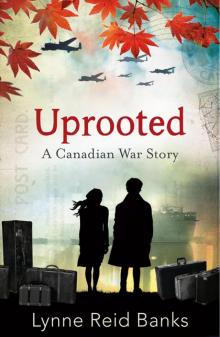 Uprooted - a Canadian War Story
Uprooted - a Canadian War Story The Backward Shadow
The Backward Shadow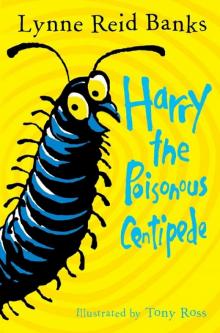 Harry the Poisonous Centipede: A Story to Make You Squirm
Harry the Poisonous Centipede: A Story to Make You Squirm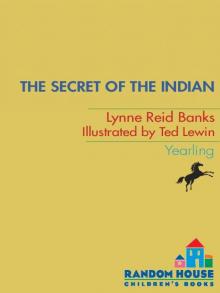 The Secret of the Indian (The Indian in the Cupboard)
The Secret of the Indian (The Indian in the Cupboard)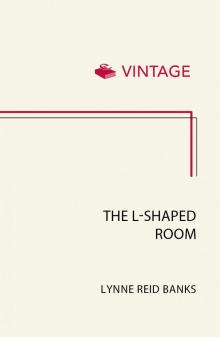 The L-Shaped Room
The L-Shaped Room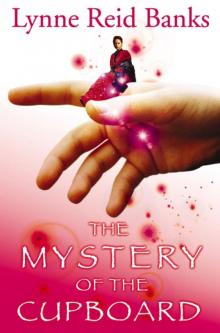 The Mystery of the Cupboard
The Mystery of the Cupboard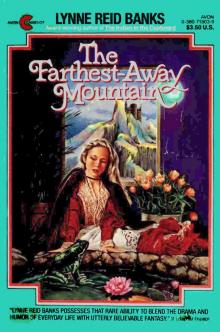 The Farthest-Away Mountain
The Farthest-Away Mountain Harry the Poisonous Centipede Goes to Sea
Harry the Poisonous Centipede Goes to Sea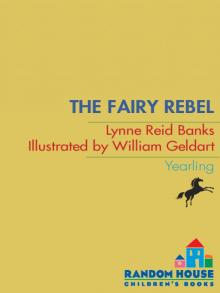 The Fairy Rebel
The Fairy Rebel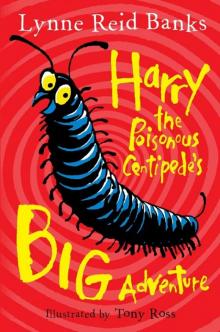 Harry the Poisonous Centipede's Big Adventure: Another Story to Make You Squirm
Harry the Poisonous Centipede's Big Adventure: Another Story to Make You Squirm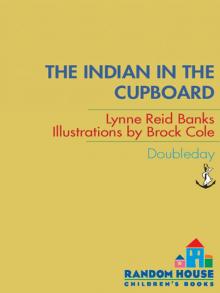 The Indian in the Cupboard
The Indian in the Cupboard The Return of the Indian
The Return of the Indian I, Houdini
I, Houdini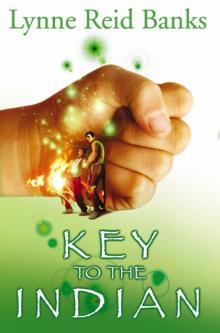 The Key to the Indian
The Key to the Indian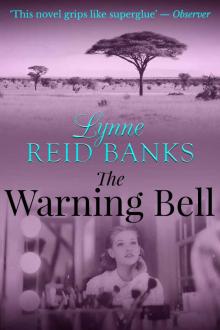 The Warning Bell
The Warning Bell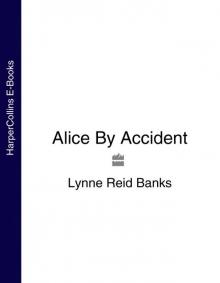 Alice by Accident
Alice by Accident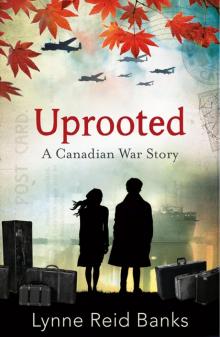 Uprooted
Uprooted Writing On the Wall
Writing On the Wall The Adventures of King Midas (Red Storybook)
The Adventures of King Midas (Red Storybook)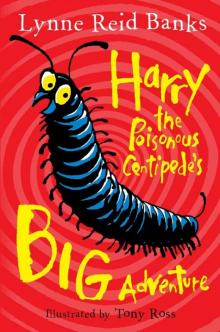 Harry the Poisonous Centipede's Big Adventure
Harry the Poisonous Centipede's Big Adventure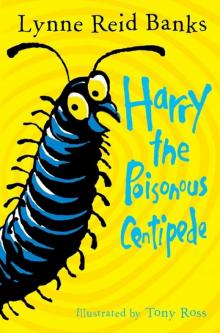 Harry the Poisonous Centipede
Harry the Poisonous Centipede The Dungeon
The Dungeon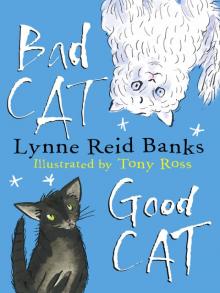 Bad Cat, Good Cat
Bad Cat, Good Cat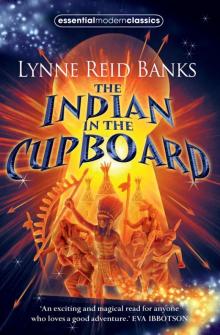 The Indian in the Cupboard (Essential Modern Classics, Book 1)
The Indian in the Cupboard (Essential Modern Classics, Book 1) Tiger, Tiger
Tiger, Tiger